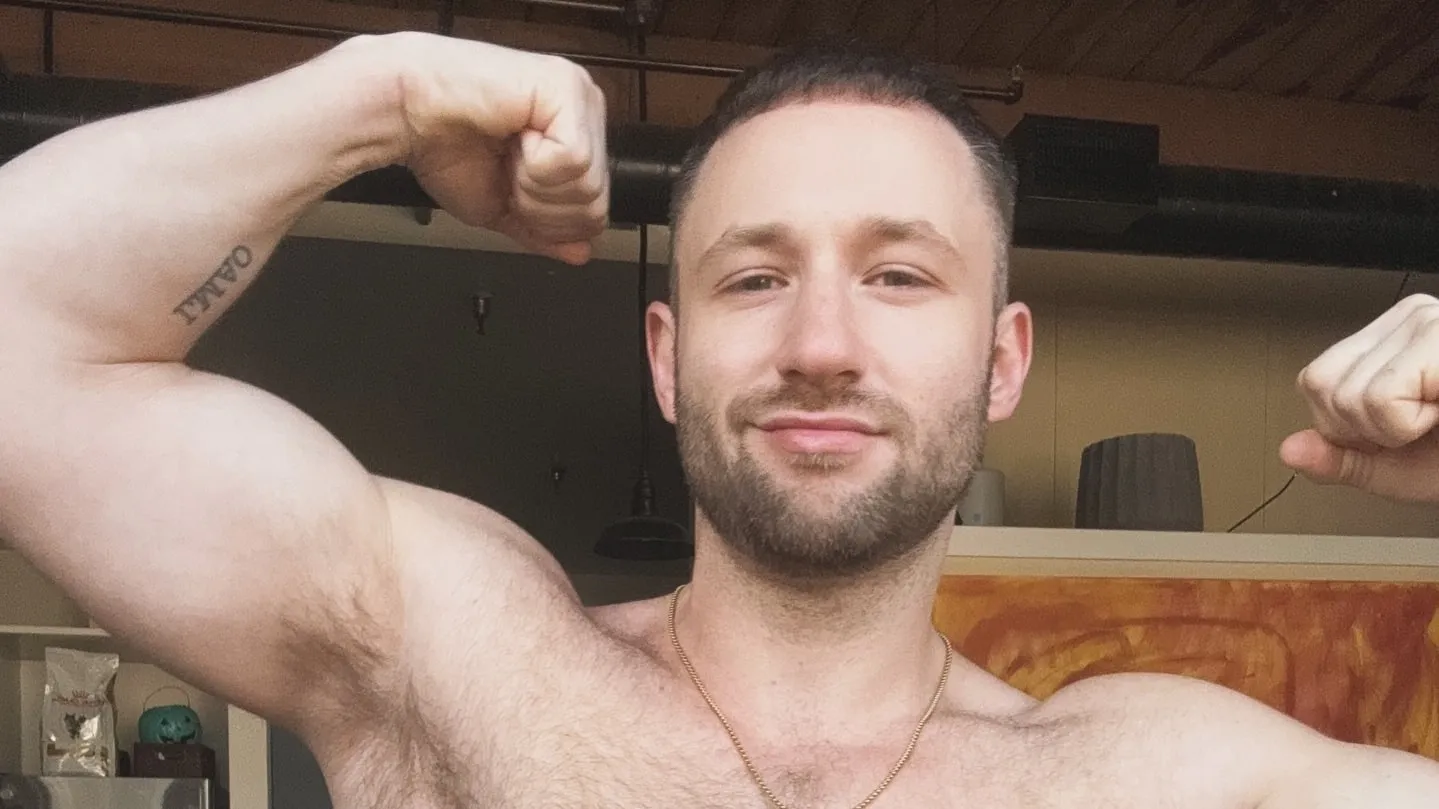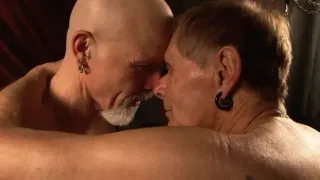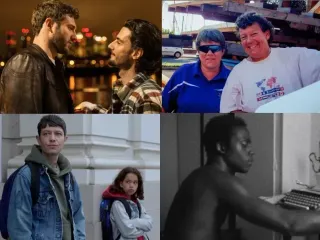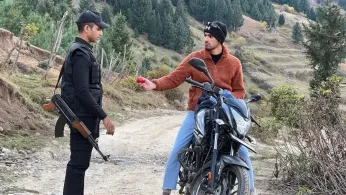
Jun 22
Frameline49: Thrilling faves at the festival’s conclusion
Brian Bromberger READ TIME: 2 MIN.
At the standing-room-only June 18 opening night film of Frameline49, Frameline Executive Director Allegra Madison in her remarks heralded a call of defiance.
“We don’t have time to despair,” she said of current events. “We have a history of reshaping language itself to accommodate who we are. Look at ballroom culture, drag culture, dyke culture in the 90s here in the Mission. Look at how gender is being redefined right before our eyes right now.
“This is the power of queerness, the ability to seize supposed truths and mold, imbue them with fantasy and desire, until the world is remade in our image. We need to redirect history. There are future generations counting on us to shape a world where they can explore their queerness and identity in ways I can’t even imagine. These future generations are telling us despair is not a luxury we can afford.”
Madison said the time to act is now.
“As queer community, when you attack one of us, you attack all of us. I can’t imagine a place I would rather be than Frameline, which uses art and creativity to battle bigotry. I’m prepared to double down our purpose to preserve, protect, and amplify our queer culture and legacy, to demand our place in the world. We’re here, because we recognize the power of our stories to ground us historically, to provide context to our current moment, and to illuminate possible futures.
“We’re here because we can change the world through the power of queer cinema. We’re here in San Francisco/Bay Area because the world is watching what we do next, how we stand up for each other, and how we meet this difficult moment. I hear from our queer filmmakers from around the world that San Francisco is a model beacon for the queer community globally. It is both our duty and our privilege to uphold and expand that image.
Sometimes the ideal couple may not be everything we think they are in the Argentinian dramedy, “300 Letters.” Jero (Cristian Mariani) and Tom (Gaston Frias) seem to be having the perfect romance (or at least social media would have you believe), despite Jero’s previous interest only in hook-ups. Tom is a poet of sorts and a bit arrogant.
On their first-year anniversary, Tom leaves Jero, giving him a box of 300 letters, written every day they were together, covering the full gamut from first sex to the first declaration of love to sharing a flat together. Tom tells Jero that after reading all of them, he will have a good idea why he’s ending their relationship.
This premise sounds gimmicky, but it’s saved by the biting commentary on current-day romances and how self-centered people can be. What we find is that this was an unequal relationship and both protagonists are not what we thought they were. Tom sees Jero as immature and shallow, while Tom is a liar and a cheater. What filmmaker Lucas Santa Ana wants to convey is how a couple can feel the opposite of what the other partner is experiencing.
In short, the film asks, did they really know each other? It’s brutal but done with elan and a pinch of compassion. Of course, we won’t spoil the burning question of whether or not Jero and Tom will get back together. Warning: Mariani is in his underwear most of the film, but I promise you won’t mind.
The corrosive impact of closets forms the heart of the South Korean drama, “Lucky, Apartment.” Hee-suh, a pharmaceutical sales employee and Sun-woo, who lost her temp job and has broken her leg, have been a same-sex couple for nine years, yet are closeted to their families and neighbors. They present themselves with that much-abused appellation, roommate.
They have purchased an apartment, though Hee-suh has provided all the money for the mortgage and interest, which she resents. The couple argue continually. Sun-woo, staying at home, smells a foul odor emanating from downstairs. She is shocked to discover the older female tenant has died. Even when the body is removed, the odor remains because the apartment hasn’t been cleaned for a long time and nothing can be done until the dead neighbor’s family is found and notified.
Sun-woo doesn’t want Hee-suh to be involved, fearing their relationship will become public and her conservative Christian family will find out the truth about her. The landlord and neighbors worry people will learn about the dead neighbor leading to a decline in the value of the apartments.
Sun-woo snoops and meets a close woman friend of the deceased, realizing they were also a lesbian couple. She wants Sun-woo to find pictures of them together. Will this crisis bring the younger couple together or drive them permanently apart? Of course, the foul odor is a metaphor for closetedness and dirty secrets. The ending is touching, but even though it’s only a 1.5 hour film, it takes a long time to get there. It’s too lowkey for considerable stretches of the movie. The other difficulty is that it’s hard to sympathize with a couple who exhibit little intimacy or kindness to each other. Still, the emotional payback at the finale is worth the bumpy ride.
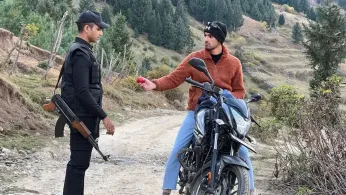
Inspired by the real-life story of a gay army major, “We Are Faheem & Karun” is a groundbreaking film in that it’s the first queer Kashmiri love story, set in Kashmir itself, in the Kashmiri language with local actors. Because the Indian army doesn’t accept the queer community, despite India decriminalizing homosexuality in 2018, the Ministry of Defense refused to give filmmaker Onir the necessary permission, branding him a renegade.
A young army man, Karun from south of India, Kerala, is posted in Gurez, a remote village in Kashmir, north of India, close to the Pakistani border. A young beautiful Kashmiri boy, Faheem, with a disarming smile appears at the check post, when by giving an apple to Karun, starts a romance.
Because of the toxic military male milieu, Karun can’t be open about his sexuality, with his family arranging a marriage for him. Faheem must struggle with being gay in Islam which considers it a sin. The film deals with both sexuality and religious barriers. Will the two men be able to stay together despite the forces arrayed against them?
The desolate, spectacular scenery plays a role in the film as does the love songs soundtrack with warm, honest performances from the two lead actors. When the world and especially Kashmir is drenched in hate and violence, the film’s message about love, acceptance, and peace and not being othered because of your sexuality or religion, nor having to be invisible, but focusing on what unites us, really strikes a chord. This small lovely bittersweet gem is worth exploring.
If Brian De Palma was going to update one of his 1980s erotic thrillers into a gay story today, the Brazilian suspense film “Night Stage,” might be the result. In Porto Alegre, southern Brazil, actors Matias and flatmate Fabio are competing with each other to deliver the climatic monologue as part of a dance/actor troupe musical, as well as each one seeking the lead in a TV series.
Matias meets Rafael on a hookup app and even though it’s just supposed to be a one-time rendezvous, they find they share a common fetish, having sex in public places. But Rafael is a candidate for mayor and must hide his sexuality. As their careers take off, their encounters become riskier. If Fabio lands his plum TV role, he will have to hide his queer identity.
Complicating matters is Rafael’s security officer, Camilo, watching them both, trying to protect Rafael. Will they choose ambition or passion? What’s clever is that being gay isn’t the issue here, since the dangerous factor is their outrageous public behavior. How high a price is a queer person willing to pay for their success?
The film is very inventive, using dance as a way of juxtaposing desire, ambition, and danger. The movement defines a world that is alive, fluid, and unpredictable, blurring the boundaries between artifice and authenticity. The camera is both voyeur and participant with shifting power dynamics. It’s all seductive and thrillingly entertaining.
A Western-style road movie characterizes the Canadian film “The Drive Back Home.” It’s Winter 1970 in a rural town in Eastern Canada and Weldon Hinson (Charlie Creed-Miles), a poor plumber, is attending his father’s funeral. He gets a phone call from a Toronto police station informing him his older brother Perley (Alan Cummings) has been arrested for having sex in a public park. If someone doesn’t retrieve him, Perley will spend years in jail with prisoners who would likely kill him.
Their mother Adelaide demands Weldon make the 1000-mile trip to bring his brother home. He picks up Perley from the station, seeing firsthand the bigotry, violence, and cruelty of the police towards his brother. He remembers when they were children, their father tried to kill Perley, but Adelaide and 11-year-old Weldon stopped him.
During the trip, old resentments flare up, with Perley seeing Weldon as an ignorant hick and Weldon viewing Perley as a perverted deviant. Will they come to an understanding or kill each other? Based on a true story relating to writer/director Michael Clowater’s uncle, the film recalls a time when men were imprisoned just for being gay.
Cummings once again plays an unrepentant gay reprobate, but is masterful as usual. This is a movie that has been made many times with a predictable ending about redemption from prejudicial attitudes, yet it has an offbeat charm and dark humor with a few unexpected plot twists. Nothing great, but the catchy premise keeps you watching.

A famous joking TV Guide blurb once described this movie as “transported to a surreal landscape, a young girl kills the first person she meets and then teams up with three strangers to kill again,” referring to the 1939 classic, “The Wizard of Oz.”
Oz fan Jeffrey McHale has made a documentary, “It’s Dorothy,” as a biography of the fictional character of Dorothy Gale, in what she has meant to America as a cultural icon for 125 years since the L.Frank Baum books were first published.
The film centers on the perspectives of women, people of color, and LGBTQ voices, all celebrating Dorothy as an enduring symbol of hope and a beacon for marginalized people. We hear from five former Dorothys who portrayed her on film, TV, and stage: Ashanti, Fairuza Balk, Danielle Hope, Nichelle Lewis, and Shanice Shantay, on how the character impacted their own lives, but alas not Diana Ross who played an adult Dorothy in the excoriated movie version of “The Wiz,” that’s still beloved by African Americans.
Oz enthusiasts like Gregory Maguire (“Wicked”), John Waters, and Rufus Wainwright, who shares a brilliant observation; “We really are being pursued again by this dark force that wants us dead, to eliminate us and steal our ruby slippers.”
For queer people, Oz’s theme of the flight of the outsider fleeing small-town isolation for the big city in search of an identity, then standing proudly in that truth of who you really are, has always resonated. Of course, McHale spotlights the most famous Dorothy, Judy Garland, even using examples from her life and other roles to make his point that this fairytale on escape and acceptance, means Dorothy is really about everyone.
This doc is everything you ever wanted to know about Dorothy and can sometimes be overwhelming in just 95 minutes. The Judy Garland portions could be assembled into its own mini-documentary, but returning to that key scene where the film transitions from black and white to color, McHale reiterates why queers love Dorothy so much. Oz fanatics will feel as if they’ve died and gone to their version of heaven.
A complicated, heavy-handed love story between a cis man and a transgender man haunts the Danish drama “Sauna.” Small-town early-20s Johann escapes to Copenhagen and lands a job as an attendant at Adonis, the city’s only gay sauna, where he not only works but shares experiences and socializes with the other guests. His life is filled with bars, parties, and Grindr hook-ups, but these endless meaningless encounters take a toll on him, as he starts to crave intimacy.
Only when he meets transgender literature student William does he really fall in love despite an awkward initial encounter. His world is upended and he projects his longing, confusions, and vulnerabilities onto William. William helps him develop deeper connections with friends, particularly his older roommate who’s co-owner of the sauna.
There are some educative moments with a strap-on dildo and Johann lovingly applying Testogel onto William’s thighs. William hasn’t had top surgery and is having bureaucratic difficulties obtaining the hormones he needs. He also experiences transphobia when he’s chased out of the sauna by one of its owners. The latter leads to Johann engaging in destructive behavior that endangers the relationship.
William ominously proclaims to Johann, “I want to be with you, but I’m only just figuring out how to be with myself.” Neither character seems able to empathize with the other. The film adopts Johann’s cis perspective rather than William’s trans world view, which some will see as problematic. Still, the film adroitly examines how sexual identity and orientation converge and diverge, complicating their relationship. “Sauna” is one of those movies whose good intentions are thwarted by a sometimes-clumsy execution, but it’s still appealing on an often-controversial topic.
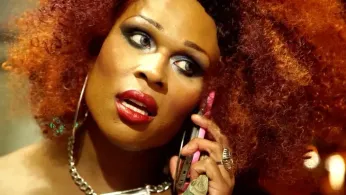
Miss Peppermint is an American actress, singer, TV personality, drag queen and activist from New York City, whose roller coaster career is profiled in the engaging documentary, “A Deeper Love: The Story of Miss Peppermint.” She became the first out transgender woman of color to compete on the popular reality TV series, “RuPaul’s Drag Race,” winning the first runner-up prize in 2017.
For years, she did small gigs and odd jobs just making ends meet, a career quickly vanishing, because the winners of “RuPaul’s Drag Race” were much more popular. She auditioned several times before finally being chosen as a contestant. Meanwhile she found refuge with supportive trans friends including actresses Laverne Cox and MJ Rodriguez, seeking acceptance in a world that marginalizes them.
After her success on RuPaul’s show, her career skyrocketed where she won awards and secured the groundbreaking role in the musical “Head Over Heels,” becoming the first transgender actress of color to originate a major Broadway role. In addition to being an independent recording artist, Miss Peppermint embarked on a sold-out tour entitled “Nubia,” featuring a cast of Black drag performers, but it was sidelined due to the COVID-19 pandemic.
She managed to perform virtual shows online to survive. Throughout all this chaos, she had breast augmentation surgery The title comes from one of her songs in which she sings, “I have a deeper love inside and I call it Pride.” She’s always been an activist, proclaiming, “We have to keep fighting for who we are, creating light for young trans people.” The larger-than-life Miss Peppermint is made for the screen. Her story is an inspirational struggle, not just to survive but thrive. Viewers will find her enchanting, rooting for her as she overcomes one setback after another.
Similar to last year’s “Mad About the Boy,” on the rediscovery of playwright, composer and actor Noel Coward, the documentary “Jean Cocteau” (1889-1963) makes the solid case for reclaiming this playwright, novelist, designer, film director, visual artist, critic, and by his own self-definition, poet, who was one of the 20th century’s foremost avant-garde artists, influenced by and influencing the surrealist and Dadaist movements.
In 1962, toward the end of his life, he sat down with an interviewer at his home in the south of France addressing his remarks to students in the year 2000. Those comments and quotes from his poems and other works, as well as his 1000 letters he wrote to his mother for over 40 years, are read by actor Josh O’Connor.
Cocteau followed his own path, but he attracted and hung out with some of the great artists of the early/mid-20th century, including Picasso, Coco Chanel, Erik Satie, Igor Stravinsky, Edith Piaf, Andre Breton, and Sergei Diaghilev, to name but a few. His 1930 monoplay, “The Human Voice,” about a woman talking on the telephone to her lover of five years leading to a crippling depression, was his first great success, as was his incest novel, “Les Enfants Terribles,” later made into a 1950 film. He’s probably best known for his films “The Orphic Trilogy,” and “Beau-ty and the Beast.”
The film covers his love affairs with actor Jean Marais (who starred in five of Cocteau’s films and eight of his plays), Raymond Radiguet, and Edouard Dermit, all co-creators. After World War II, he was arraigned on charges of collaborating with the Nazis, pertaining to his acquaintance with the Nazi sculptor Arno Breker (claiming friendship was more important than politics) as well as a few off-hand comments about Hitler, but was cleared of any wrongdoing.
He was seen as cool and a hipster in the early 1960s. Director Lisa Immordino Vreeland has made a conventional documentary (though it’s not chronological) of a very unconventional, almost undefinable celebrity, who remains an enigma. Let’s hope there will be a renaissance of this artist, unfairly forgotten, a polymath genius decades ahead of his time.
Manila at nights teems with danger and possibilities in the tense, gritty Filippino drama, “Some Nights I Feel Like Walking.” Sex worker Uno meets distressed runaway teenager Zion in a bus terminal and they bond in their brief encounter. Uno lives with three other hustlers in a boarding house, supposedly working as masseurs but they look for clients in the streets, bathrooms, and porn theaters.
Two years later, Uno and Zion meet again as hustlers booked by the same client. That same night Uno’s friend Ge is found overdosed by his client. Zion reveals to Uno and his other friends that before he died, Ge’s dying wish was to take him home. Together they lug Ge’s body in a bag around the city to a remote village where a festival is happening, via buses and highways.
It becomes clear that Zion is from a wealthy family but is estranged from them. He wants to belong to the group but recognizes this might not be possible, in spite of being attracted to Uno. Uno summarizes his own dilemma, when he says, “This work brainwashes us into thinking that we don’t own anything including our bodies.”
He desperately wants a future and escape from this life, hoping maybe Zion can help. It is this touching vulnerability that wins us over. In all their travels they discover they are rejected everywhere and their only home is with each other. The ending is very touching. Although the film can meander, its portrait of grief and healing soars over its flaws. A small gem that takes us into a world we would never enter and makes us care about the fate of these outcasts.
The transformative power of creativity to confront systemic injustice that brings a community together to find strength, solidarity, and liberation is at the root of the must-see documentary “Assembly.”
Internationally acclaimed Rashaad Newsome is creating a multimedia exhibition called “Assembly” at New York’s historic Park Avenue (military) Armory celebrating Black queer culture through music, dance, collages, video projections, holograms, and African fractal pat-terns. The hybrid documentary, which is almost its own artistic work, blurs the line between performance and activism.
It encompasses Rashaad’s own biography growing up in rural Louisiana reckoning with his past and identity, life stories of the dancers, singers, musicians, and poets in the collaboration who felt unsafe, had to hide their sexuality/gender or saw themselves as invisible, Rashaad’s creative process, and excerpts from the show itself, which ran for two months in 2022.
He uses global fem vogue performers, who mix vogue with aspects of their nation’s traditional dances (i.e. Brazilian capoeira, Ukrainian hopak), their movement expressing a queer utopia. The film breaks ground by featuring an interactive, nonbinary AI character, Being, who serves as a narrator teaching the critical importance of decolonization and proclaiming a post-race, post-gender futurity, based on lesbian philosopher bell hooks’ critique of the imperialist white supremacist capitalist patriarchy that dominates and distorts our society.
Even when the theory goes over one’s head, this is still a bold and visually captivating film that is dynamic and immersive. There’s always something dazzling being projected with spectacular costumes and makeup. One wishes there were longer sections from the show itself, as most of the documentary centers on how “Assembly” was born, rehearsals, and then the aftermath.
Newsome co-directs with Bay Area resident Johnny Symons, documentary filmmaker and Professor of Cinema Studies at SF State University. An artistic triumph, it’s the most innovative documentary of Frameline49, offering us a future vision of unlimited possibilities when we allow love to empower us to live fully and freely in joyful resilient communities.
Four close gay friends, Lovro, a filmmaker; Nenad, a writer; Stevan, an artist; and Ivan, an actor, journey together for 20 years through incredible highs and lows, in Ivona Juka’s Croatian odyssey, “Beautiful Evening, Beautiful Day,” the country’s official Oscar submission last year.
After seeing occupying Nazi forces removing Jews and Serbs, they all join the partisans in World War II. They become highly decorated war heroes, which gives them cover for their homosexuality, as they become renowned filmmakers in communist Yugoslavia.
However, one scene in their latest film suggesting a soldier and a border guard abandoning their posts together, attracts the attention of the censorship board. They send Emir, a straight mid-level communist party loyalist/bureaucrat to oversee the film and sabotage it from within.
Lovro and Nenad are long-time lovers and in a touching scene are filmed skinny-dipping on the coast, evidence later used by the government to convict them of deviant behavior. They are sent to a notorious prison on Barren Island, which has no cells because there is no escape. They are brutalized, raped, and tortured for their sexuality.
The film features frontal nudity, graphic gay sex (it wouldn’t make it through USA censors) as well as violent scenes depicting cruelty and persecution that are incredibly difficult to watch. There is one scene toward the end where this black-and-white film flips to living color that blows your mind. The ending is transcendent.
The chief flaw is that Juka concentrates more on the narrative rather than the inner lives of the characters, so we’re often not sure what their motivations are. Yet the film brilliantly essays how art and love are not only sources of hope, but acts of resistance. Despite their imprisonment and persecution, the characters never give up. That message of resilience is the festival’s answer to attacks on the queer community. Despite some drawbacks, this film is the piece de resistance of Frameline49.
